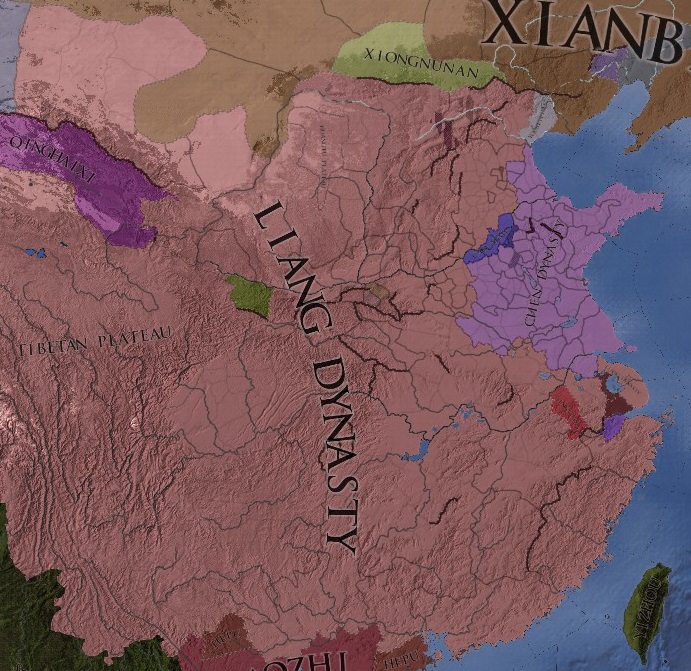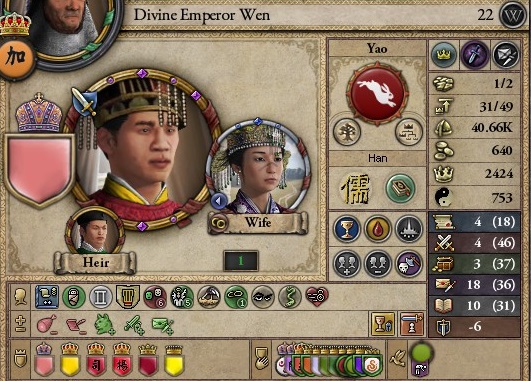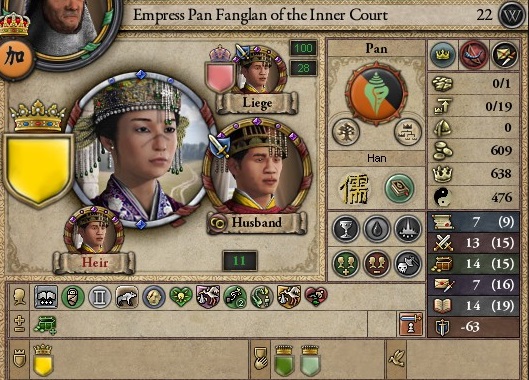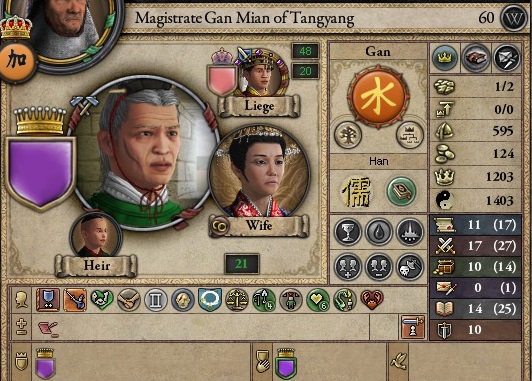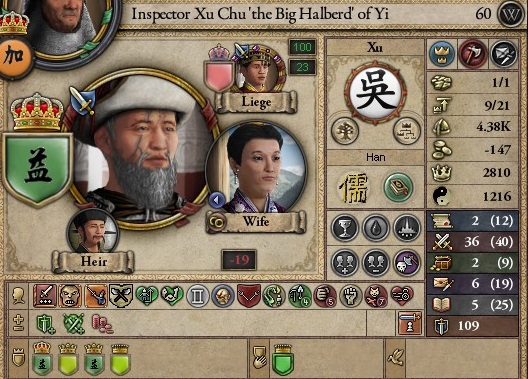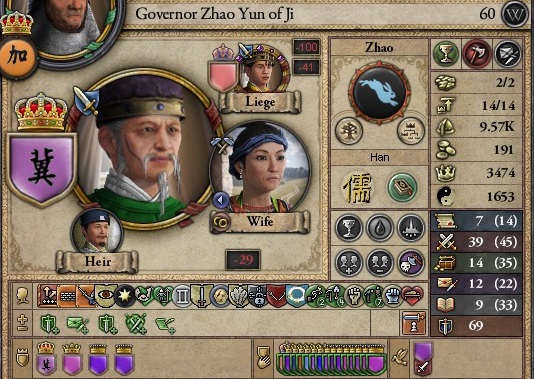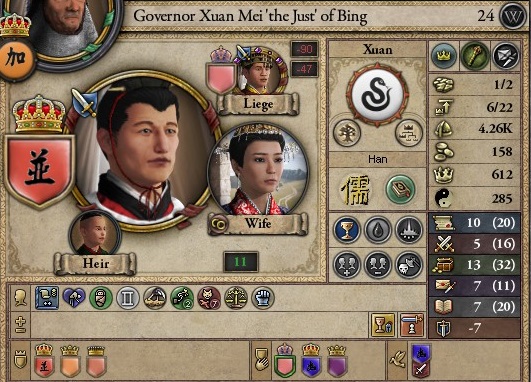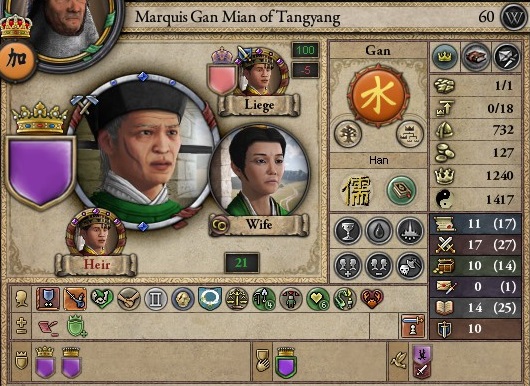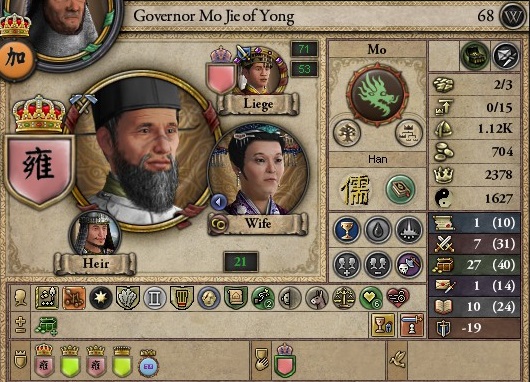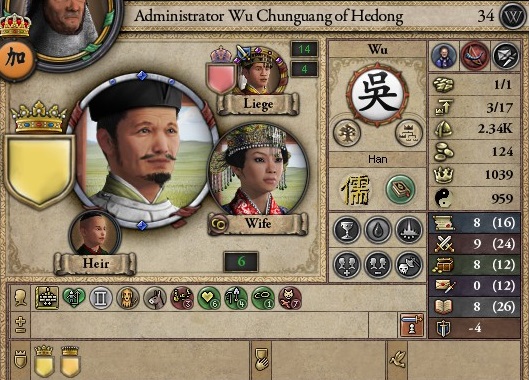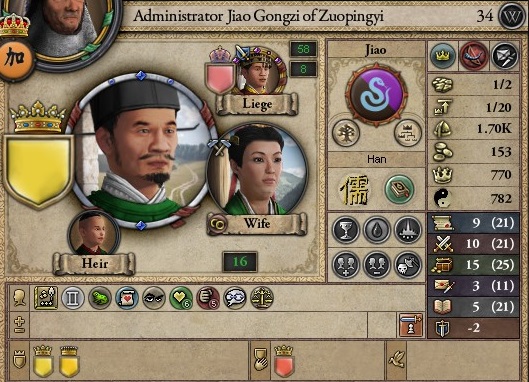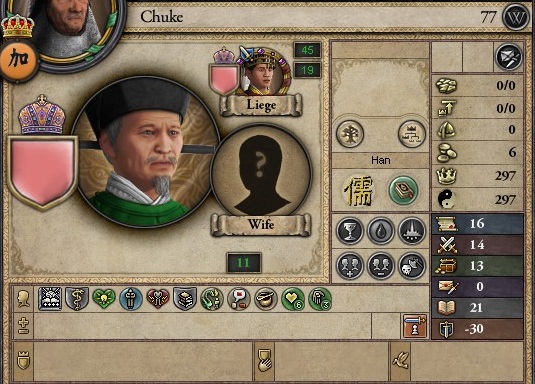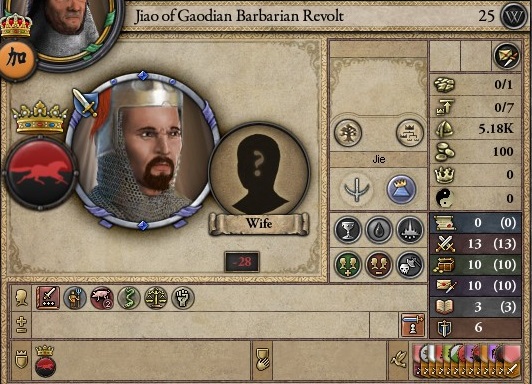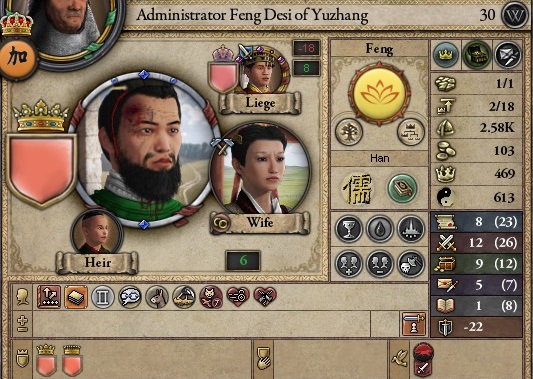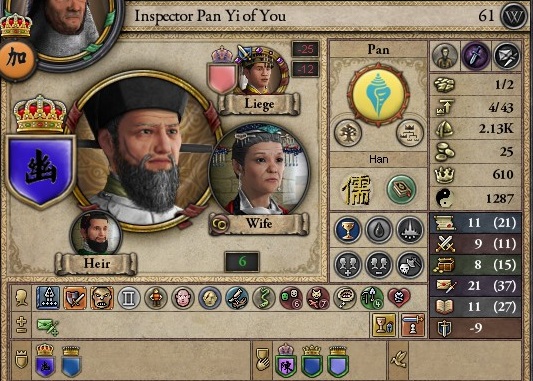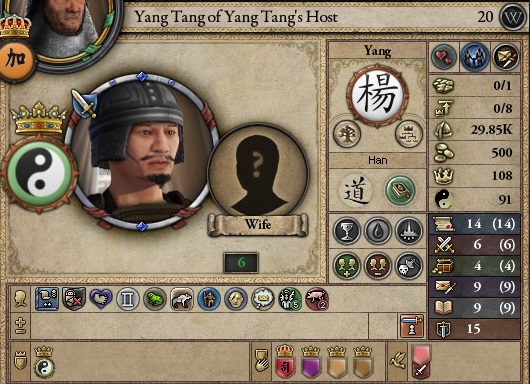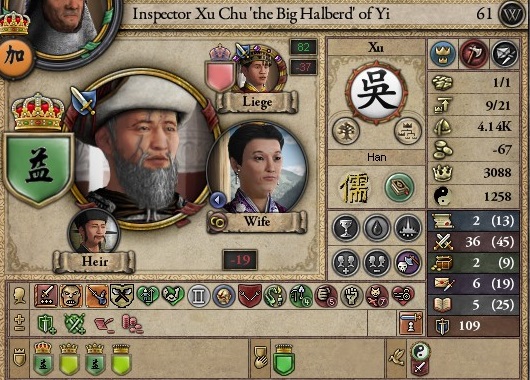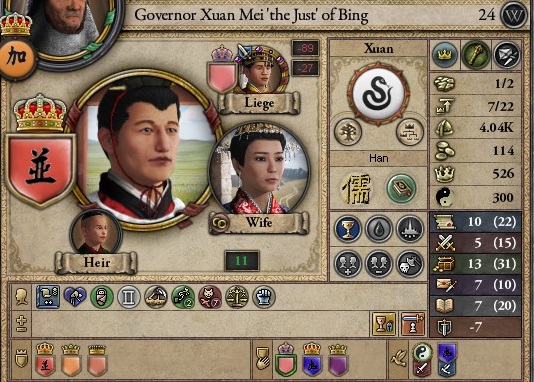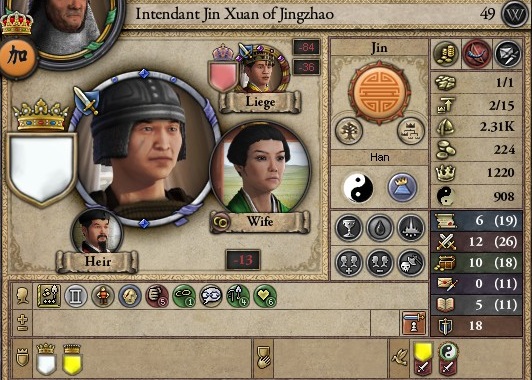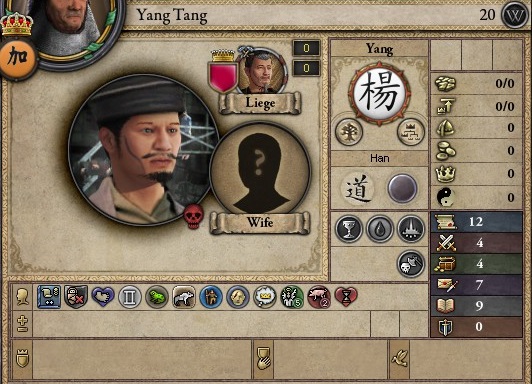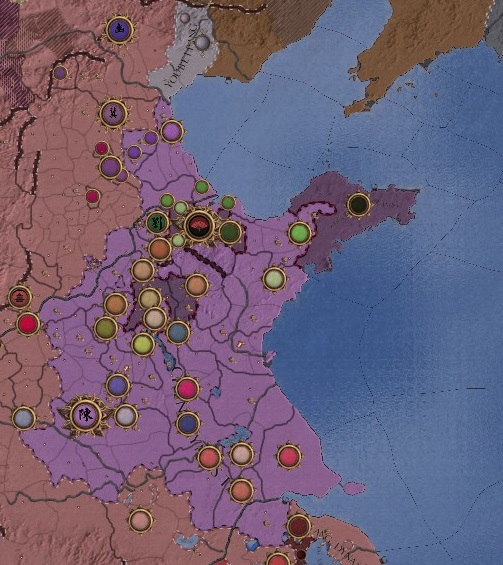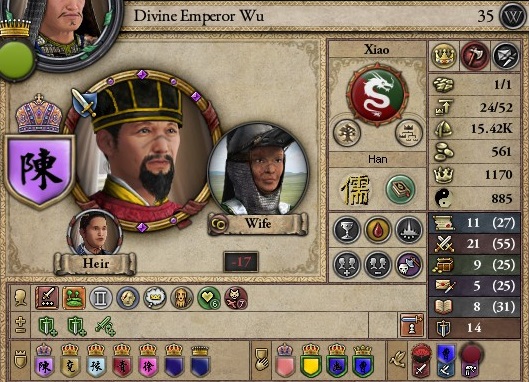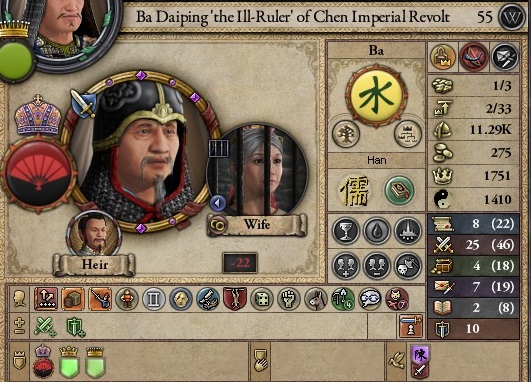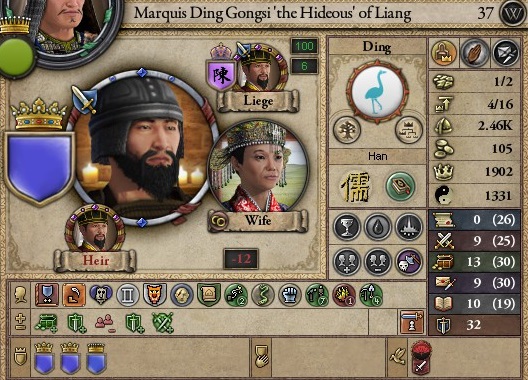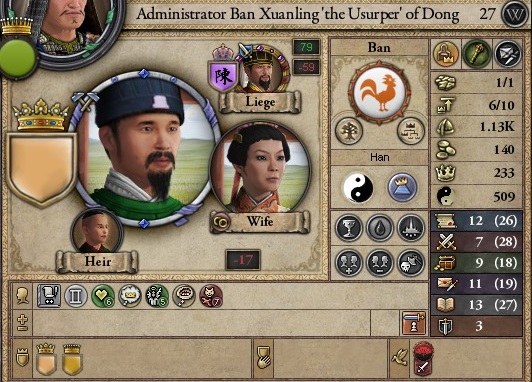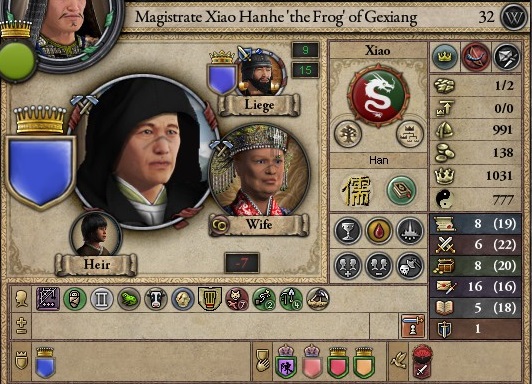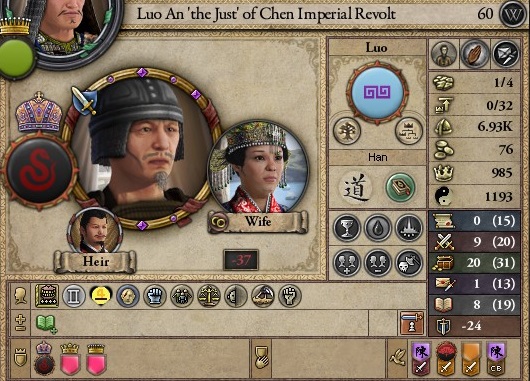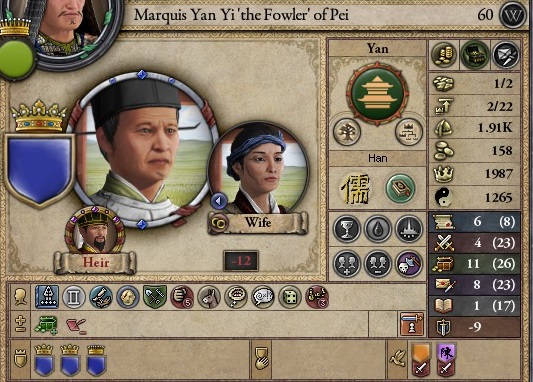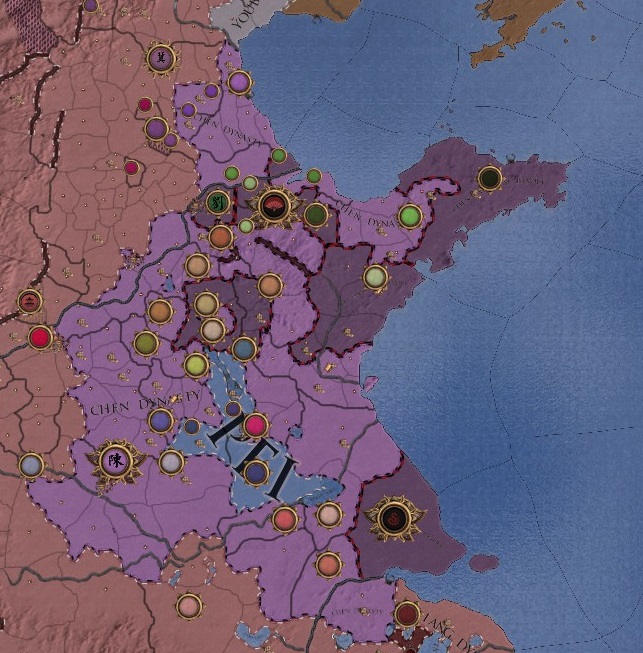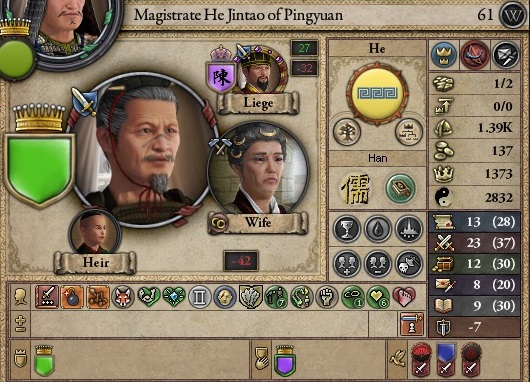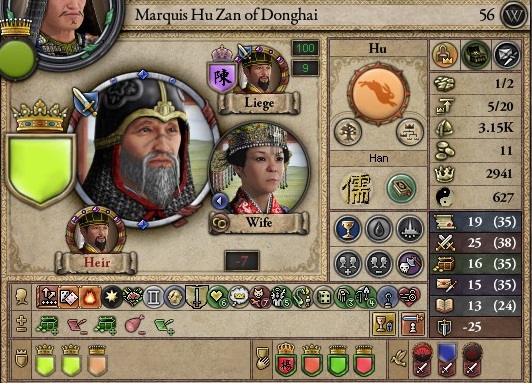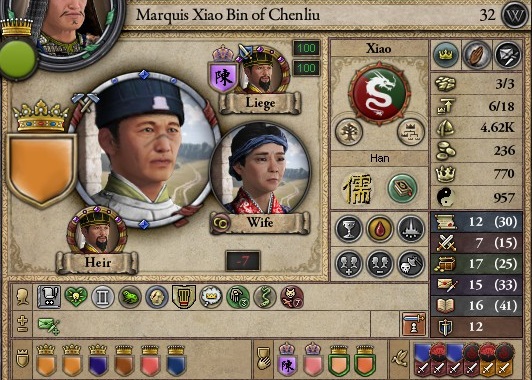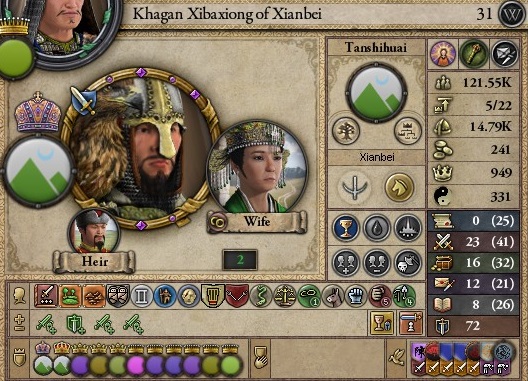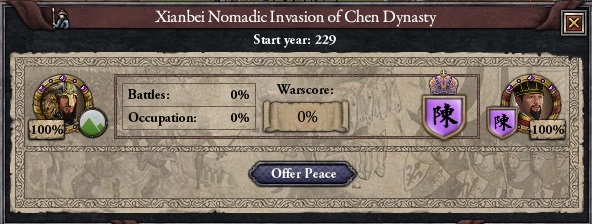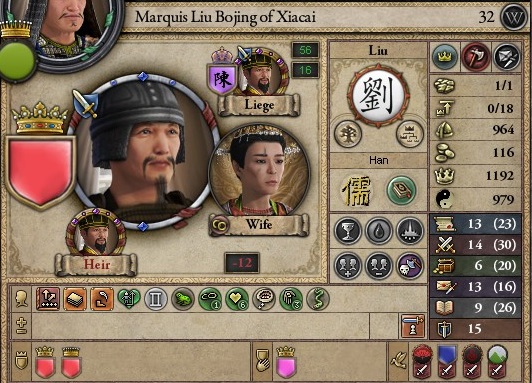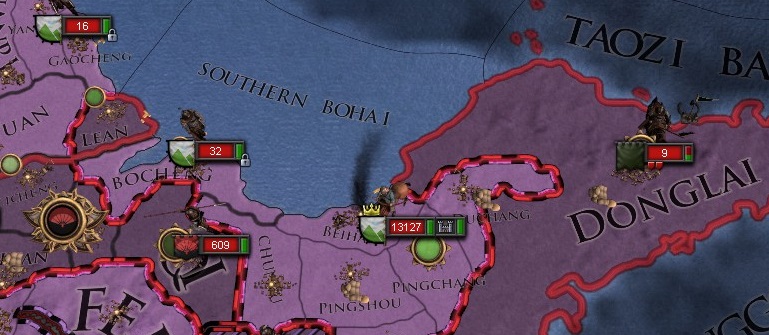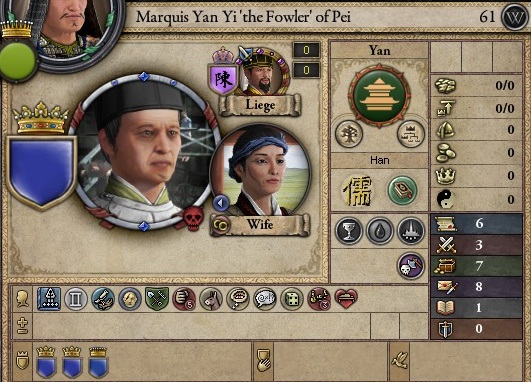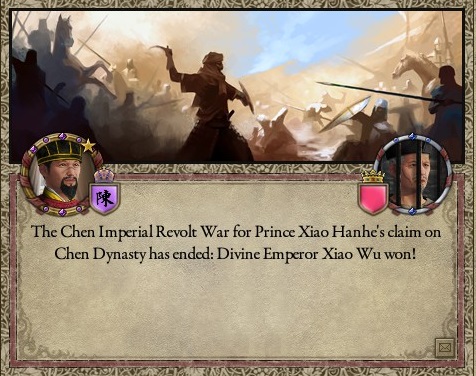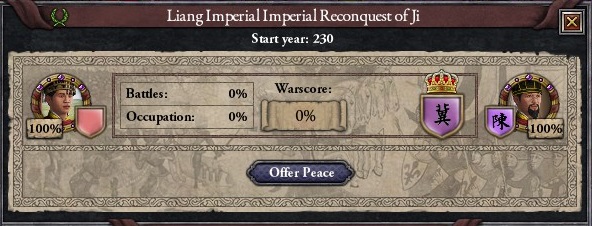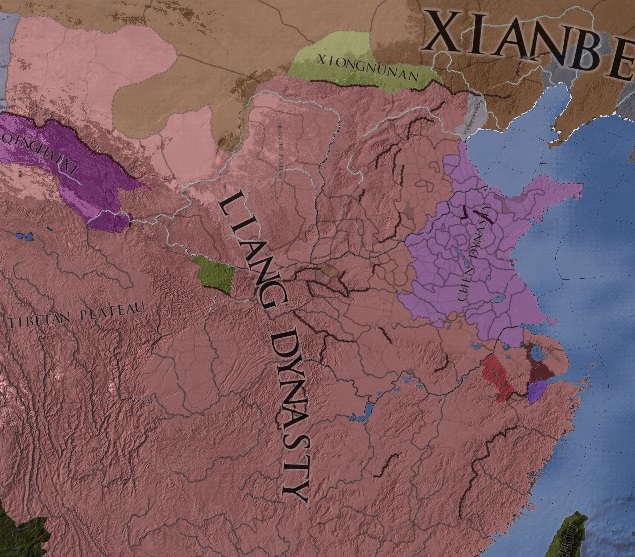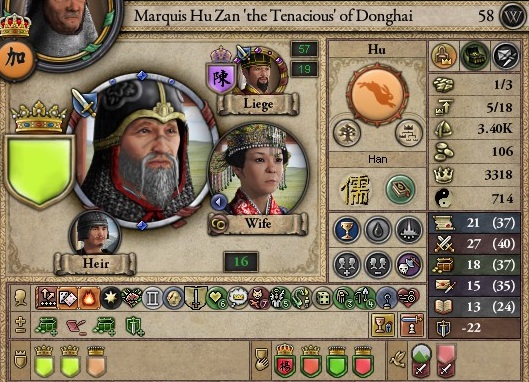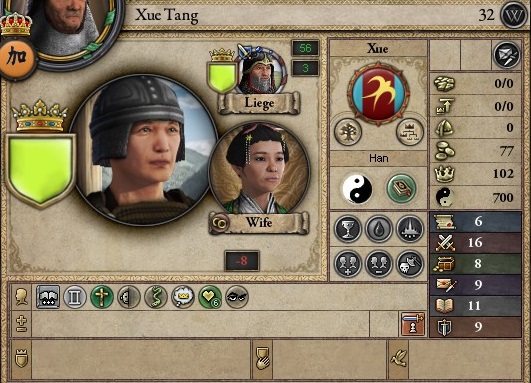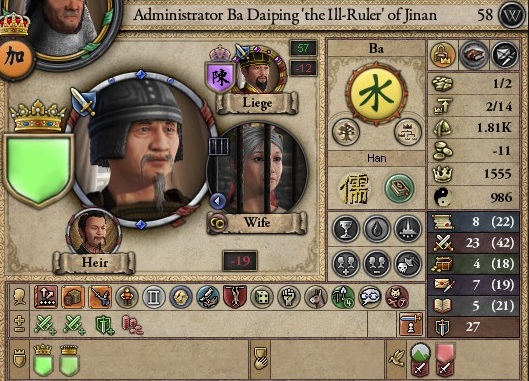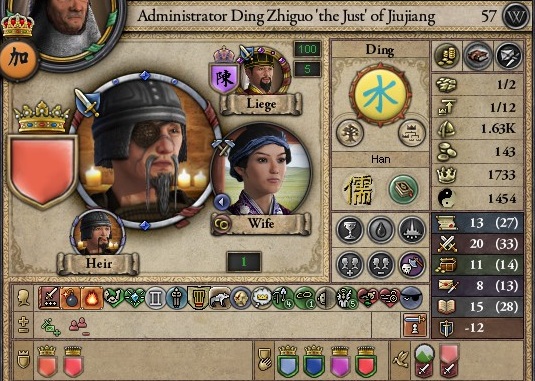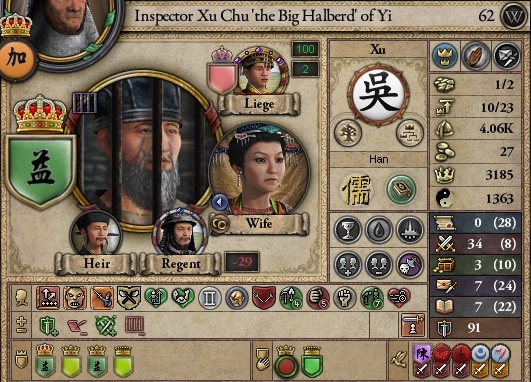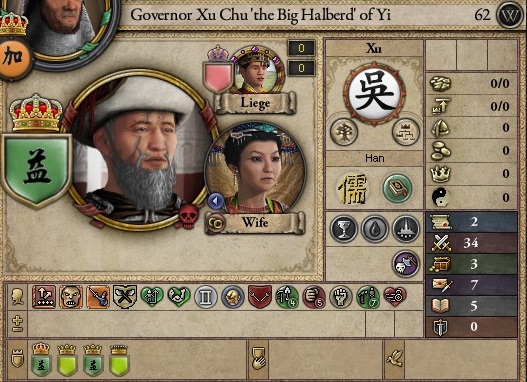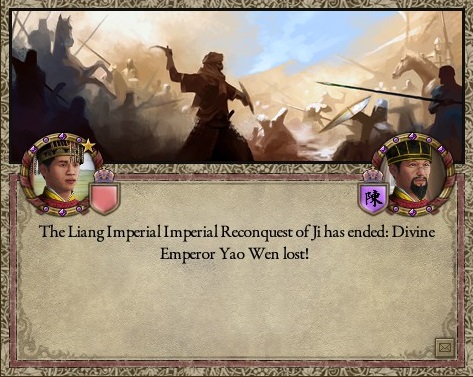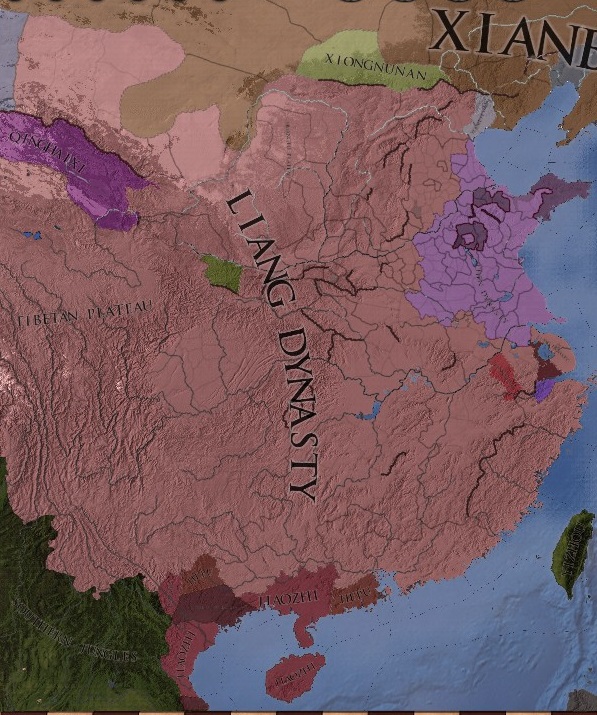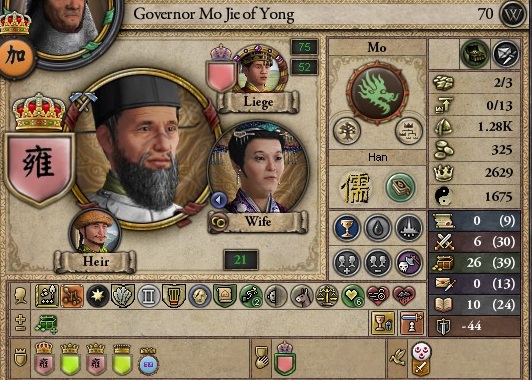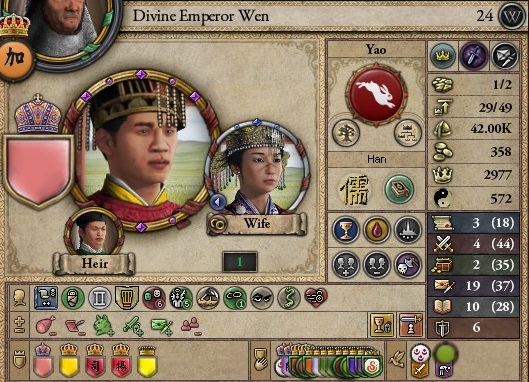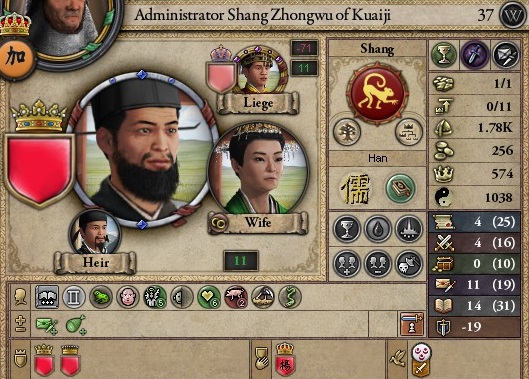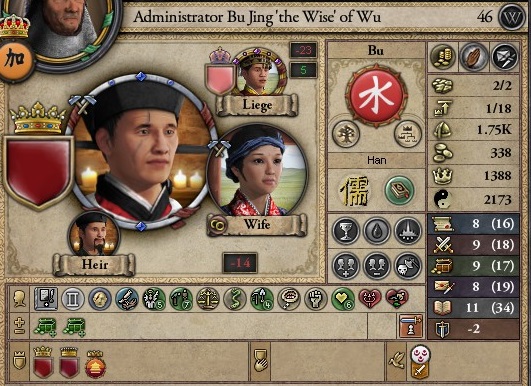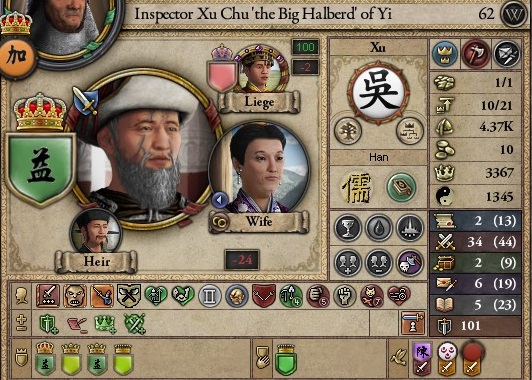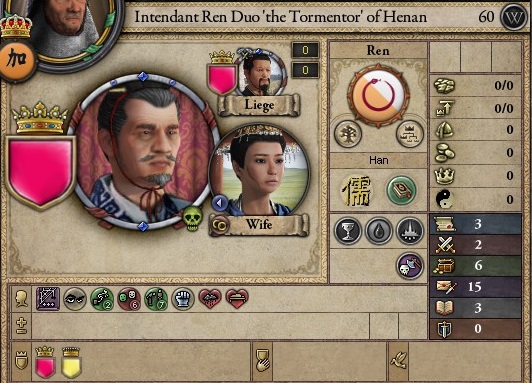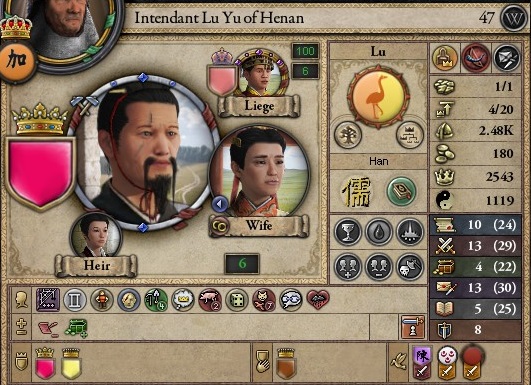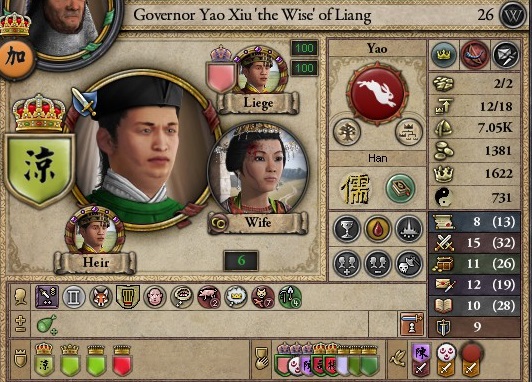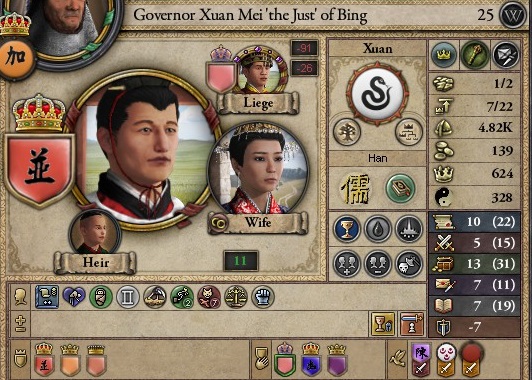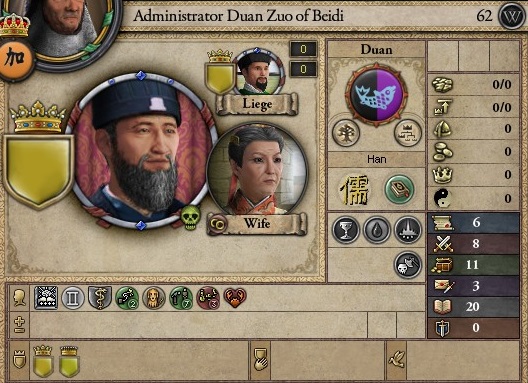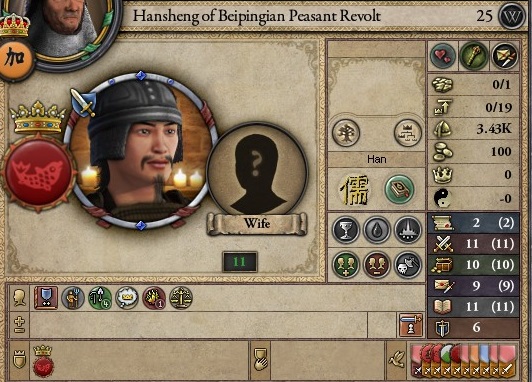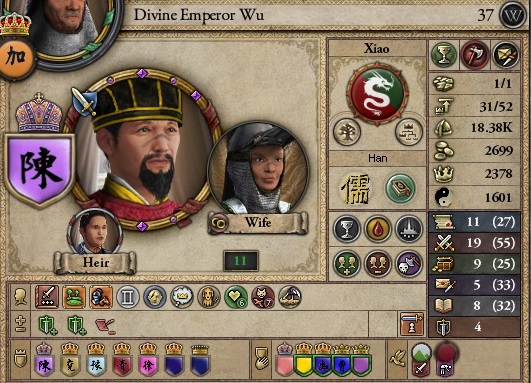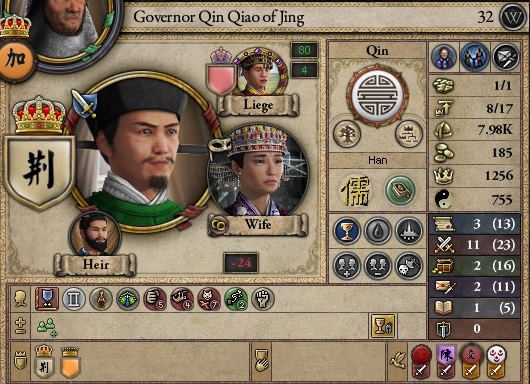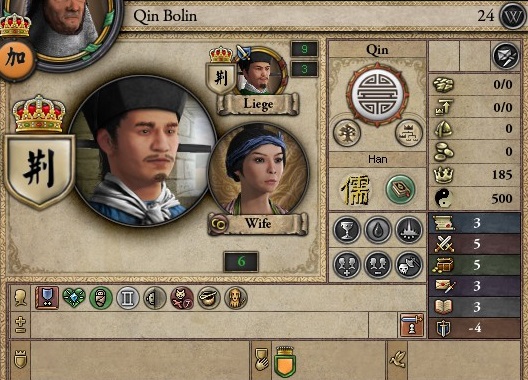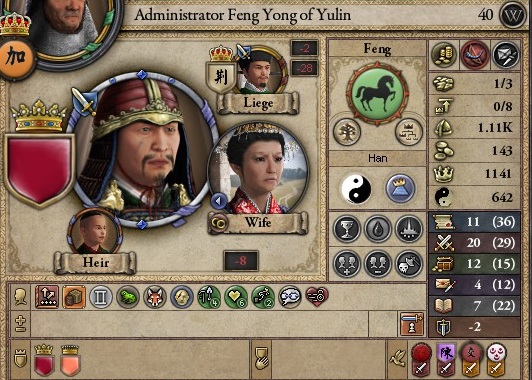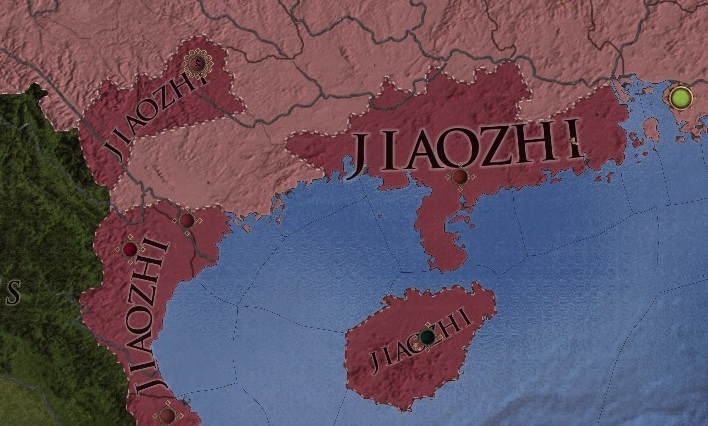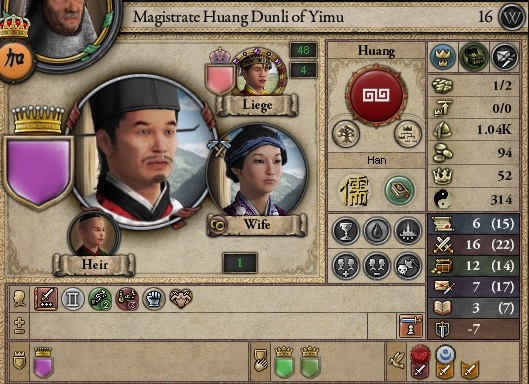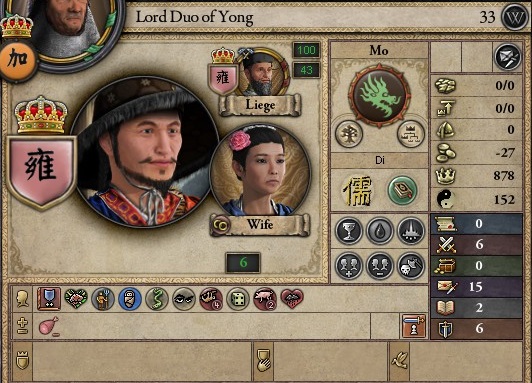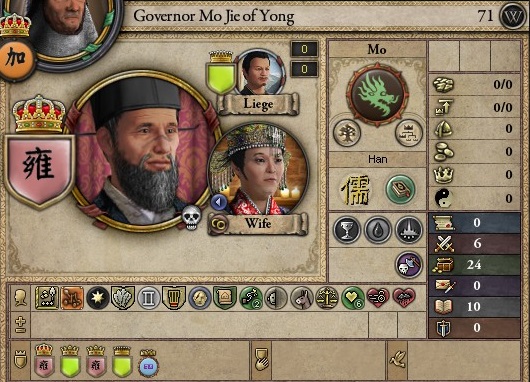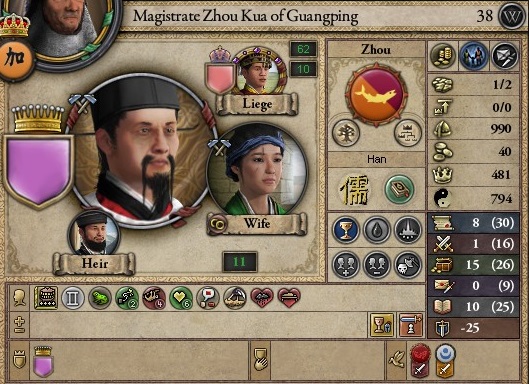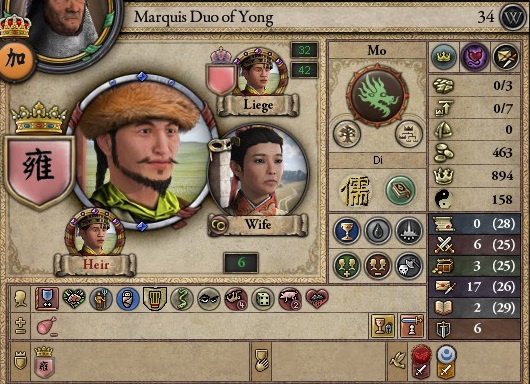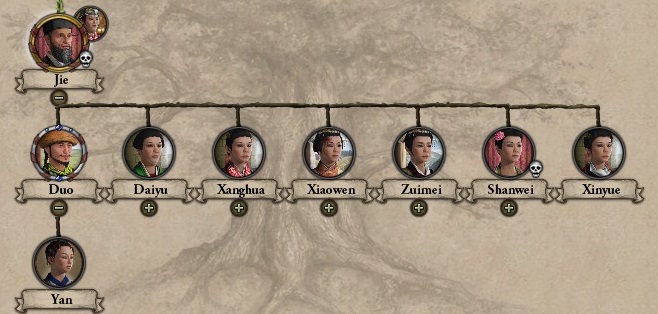230-231: CLASH OF EMPIRES
Xu Chu was seeing the troubles that were besetting the Chen Dynasty. He could see that it was weakened, that it was distracted. And now he had the opportunity to strike, to conquer the enemy of the Liang, to become the greatest man alive! Not even
Emperor Anwu had managed to unify China and defeat the Chen Dynasty on the battlefield (though this was more due to his untimely death than his lack of skills). Having just defeated Yang Tang and now sitting on the border, he decided that it was time to destroy this pesky Chen Dynasty once and for all. Yes, it was about time to unify the realm under his… the Emperor’s rule. Talking of the Emperor, he would need to be “convinced” of the necessity of this campaign.
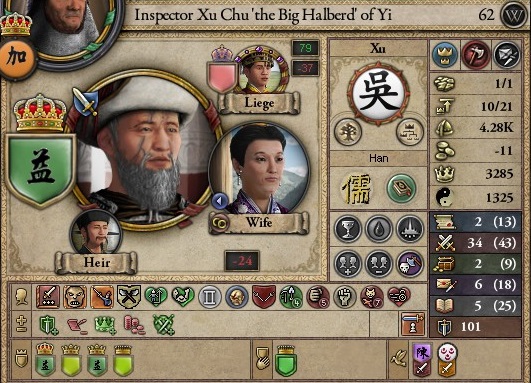
But surprisingly, Emperor Wen had decided that now was the time to try and grow a spine. When Xu Chu’s messengers arrived to Chang’an, Emperor Wen dismissed them quickly without agreeing to the campaign. Instead, he sent envoys to Xu Chu’s camp, presenting evidences of the Grand Commandant’s actions against the Son of Heaven and the violence he had employed at court. Emperor Wen now wanted Xu Chu to answer for his actions. But when the envoys arrived to the camp and presented the accusations to Xu Chu, he simply proceeded to laugh, after which he went on to beat one of the envoys to death. The Grand Commandant followed this show of strength by once again sending his war plans to Chang’an. Now completely spooked, Emperor Wen quickly agreed to a campaign against the Chen Dynasty. However, he declared that the goal was to seize the parts of Ji Province controlled by the Chen instead of the complete conquest of the rival dynasty. A small attempt to stop Xu Chu from reunifying China, one that the Grand Commandant would do his best to ignore.
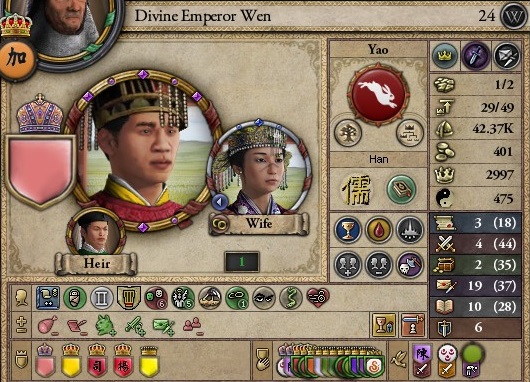
And this is how, at the end of January 230, the Liang and Chen Dynasties came to fight each other. It immediately had a massive impact in the latter. News of the incoming invasion by the Liang Dynasty quickly led to the end of the civil war that was still dividing the Chen. Ba Daiping’s goal had been to regain his position at court because he was convinced that he was the best man to fulfill these duties, to protect the Dynasty. But his revolt lost any relevance with the Chen now threatened by both the Xianbei Confederacy and the Liang Dynasty. Continuing to fight against Emperor Wu would mean hurting the dynasty he had sworn to protect. While some of his allies were reticent to the idea, Ba Daiping offered Emperor Wu to end the civil war without condition and to help against the enemies of the Dynasty.
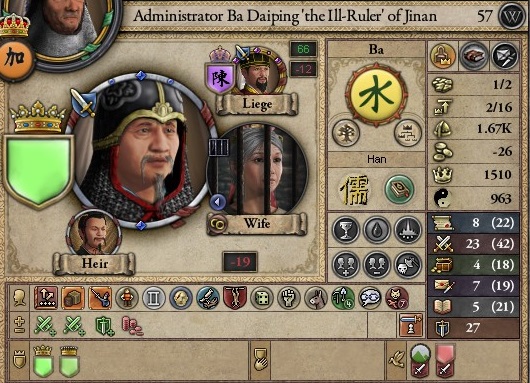
Emperor Wu was hesitant to accept these traitors back into his ranks at first. He felt personally betrayed by Ba Daiping and his brother Xiao Dang for rebelling against him and didn’t know if he had it in him to forgive them. But everyone advised him to make peace. Xiao Bin told him that a united Chen was what they needed at the moment, and
Hu Zan pointed out how competent generals like Ba Daiping and the afflux of new troops from the former rebels could prove the tipping point in the incoming conflict. Even Changle was telling her husband that he should seek peace first and foremost. However, she was also advising that he make peace with her brother, which was a bridge too far for Emperor Wu. In the end, the revolt ended, and Ba Daiping was allowed to rejoin the Emperor as one of the great generals of the Chen Dynasty.
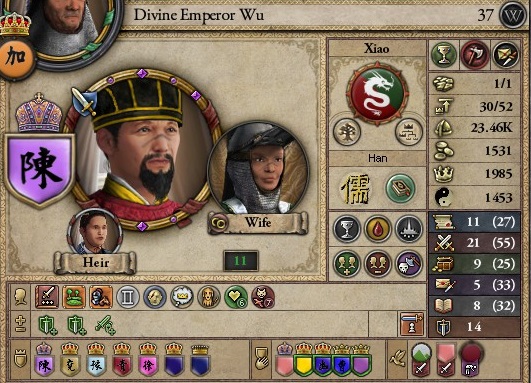
And this reunification of the Chen was followed by a victory by the Grand Commandant Hu Zan over the Xianbei invaders, which only helped to motivate the two sides in uniting against their enemies. One of the subordinate Khans of the XIanbei Confederacy had decided to seek glory for himself instead of sticking with Xibaxiong. This proved a terrible idea, as it allowed Hu Zan and his officers to attack this weaker horde. With Emperor Wu having returned to Chenguo to prepare its defense, the Grand Commandant was now fully in charge, with younger officers like his protégé Xue Tang given the chance to make their proofs under his experience command. This battle would prove a victory for the Chen, though Hu Zan was unhappy at the losses sustained by fighting the horse riders.
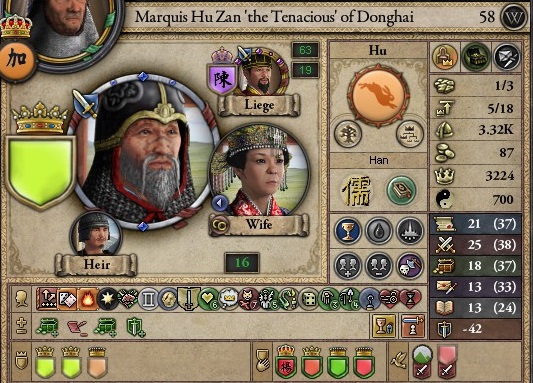

But while young officers were given the opportunity to rise, one of the older one would sadly leave the stage permanently. In March 230, the Chen court was notified of the death of Chen Tiao at the age of 70. He had been the first ever Grand Commandant of the Chen Dynasty and had served as the top military officer of Chen (first the province and then dynasty) for more than a decade, providing much needed stability to
Emperor Cheng’s government. He had always been honorable and loyal to the Chen, even if it meant rebelling against its first emperor to save it. It is said that he survived this long due to his desire to leave the Chen united, and so passed away peacefully once the civil war was ended on good terms. For his extraordinary service to the Chen Dynasty, Emperor Wu gladly allowed Chen Tiao’s oldest son to inherit the title of Marquis of Jiyin. Both Ba Daiping and Hu Zan, who had fought on different sides of the civil war only months ago, put funerary tablets in their camps to mourn the old general. What a loss for the Dynasty in its hour of need.
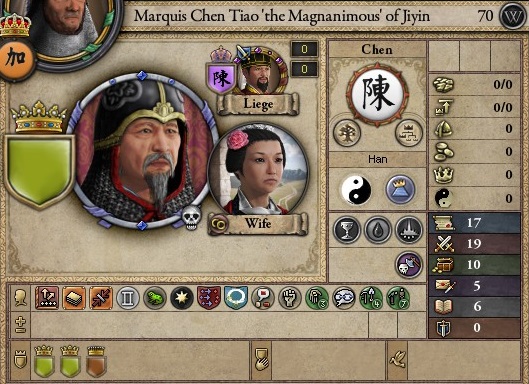
In April, Hu Zan achieved another victory against the Xianbei, though once again this was not against the main army of Xibaxiong. The Khagan of the Xianbei Confederacy still represented a menace far too dangerous to engage, especially with the threat of the Liang Dynasty still looming in the background. Instead, this war was mostly fought against the Korean tributaries of the Xianbei Confederacy, with the Kingdom of Goguryeo representing the bulk of this army (though it was assisted by some nomadic horsemen). Once again, Hu Zan was able to defeat the enemy, this time stopping their advance from progressing beyond the coast of Qing Province. Xue Tang proved particularly useful in this fight, playing a key role in the strategy which Hu Zan used during the battle. While this didn’t mean victory, it at least ensured that the Xianbeis would be limited in their progression for the time being.
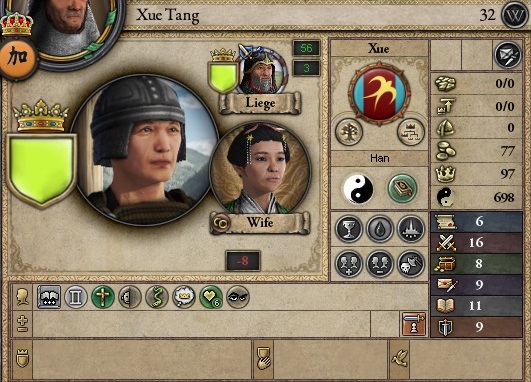

It was around that time that Emperor Wen sent new troops to reinforce Hu Zan. He needed his Grand Commandant to be able to command a decisive force, one able to crush whatever challenge stood in their way. Alongside these reinforcements came the other two greatest generals of the Chen Dynasty to help Hu Zan. First was Ba Daiping, now back as a loyal general and ready to help. His presence was the source of tensions among the officers, not the least because he had been the traitor they had been fighting only a year ago. Although they still feuded over the office of Grand Commandant, both Hu Zan and Ba Daiping agreed to put their disputes aside for the moment.
With them was Ding Zhiguo, the one-eyed general and brother-in-law of the Emperor. Now, his last moment of relevance had been his capture by the Cao Army during the invasion of Dong Commandery, having played no role in the recent civil wars. The reason for this is because… well, the Cao Army kept him prisoner even after they lost their territories, thus missing the whole year of 229. He in fact only made his way back to the Imperial Capital in February, finding the Dynasty under attack from both sides. Even with his bad luck on the battlefield, Ding Zhiguo still remained one of the best generals at the Dynasty’s disposal. With Hu Zan, Ba Daiping and Ding Zhiguo now leading the war, the Chen had experienced and competent leaders who had the best chance of achieving victory.
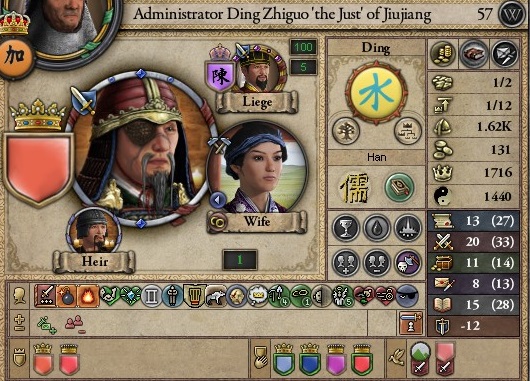
And this trio proved successful. Putting aside personal disagreement, they would act as a team and fulfill their duties with bravo. Since the Liang had yet to show up, the first part of the summer was spent once again fighting the Xianbei invaders. Again, they were smart enough to avoid any direct confrontation with Xibaxiong, though Ba Daiping almost pushed for it at one point. In the end, they were able to achieve two new victories against small barbarian armies. Yes, these were minor victories, but considering the dire situation, the Chen Dynasty would take any win it could get.

It was only in August that a Liang army finally crossed the border between the two states, which at multiple points was marked by the Yellow River. However, this army was far smaller than expected, and it wasn’t led by the Grand Commandant Xu Chu. Instead, it was a vanguard army led by a younger general named Hu Bodu. This was once again one of the many attempts by Emperor Wen to build an officer to rival Xu Chu. But unlike Fang Desi, Hu Bodu was closer to Xu Chu in arrogance in temper, leaving him willing to stand up to the brute. He was convinced that he had a great destiny awaiting him, and saw Xu Chu as nothing but a wall blocking his rise. He was also greedy, which is why he happily sold some of his supply to local Chen merchants to fill up his pockets the second he entered the Chen Dynasty.
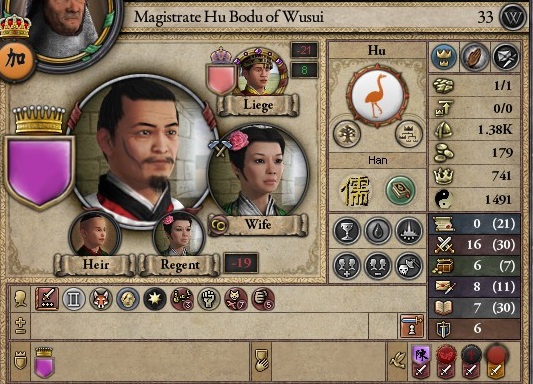
The three generals were quick to react, moving to meet this first army that had crossed the Yellow River before it could march south on Chenguo. Hu Bodu awaited them patiently, convinced that he could defeat these great generals without Xu Chu’s help as long as he fortified his position and prepared his defenses. And worst-case scenario, he had enough supply to last for weeks… wait… Supply would not be Hu Bodu’s only faux pas, as he clearly lacked information on the Chen army’s size. He was easily crushed, with half of his troops captured or killed, and the other half racing away to safety. The general was himself captured by Ding Zhiguo, who took great pleasure of informing his defeated foe that he would spend the rest of this war as a prisoner. This was the first battle between both dynasties, and it was a resounding victory for the Chen.

Xu Chu only showed up in November, having been held up by a barbarian revolt on the border. He had brought an army roughly equal to that of the Chen, as some Liang troops needed to put down other peasant uprisings in the rest of the Dynasty. Both sides settled camp on their side of the Yellow River, this key waterway that marked the border between their states. On sunny days, the two armies could see each other, with no ability to fight it out. Hu Zan had ordered the bridges destroyed before the main Liang army arrived, the idea being that it would force the enemy to cross the river to fight them. And the army which would have its back against the water would be the vulnerable one, the one which would panic when pushed.
And this seemed to work, as in the Liang camp Xu Chu was frustrated by his inability to cross. Deciding that he needed to get the advantage, he started to build rafts, though he made no indication that he was planning to use them soon (mostly because his subordinates tried to hinder his work out of jealousy or on the Emperor’s orders). This made the Chen generals worried. It was one thing to have the advantage of terrain, but if the Liang army was waiting for reinforcement, then their soldiers’ morale would plumet at the sight of a massive Liang army on the other side of the river. Ba Daiping was the one to finally speak what they all thought:
“We need to strike first”. The two sides thus worked on crossing the Yellow River, starting a race to see who would put himself to a disadvantage the fastest.
In the end, Xu Chu’s head start allowed him to cross first in December after a month of waiting. The Chen army was ready for him, taking their positions in a failed attempt to push back the Liang army into the water before it could properly organize. But Xu Chu crossed, thus started one of the greatest battles of the history of this period. Xu Chu and Hu Zan, who had never met before, found themselves commanding the center of their respective forces. The brute did try to find his opponent to slay him on the battlefield, but had no luck in his search. Hu Zan was no fighter, instead ordering this battle from a place of safety where he could see the whole battlefield.
Neither Xu Chu nor Hu Zan showed any sign of weakening, even as the Liang army fought with the Yellow River against its back. But while Hu Zan was assisted by two fellow generals of renown, Xu Chu’s subordinates proved less impressive. In the end, the weak link proved to be the former Liang Chancellor Jin Xuan, who was commanding the right flank. Against him were the relentless assaults of Ba Daiping, which finally worn him down after a few days of fighting. And with the right flank collapsing, Ba Daiping and Hu Zan were able to coordinate against Xu Chu. To counter this, Xu Chu had to recall troops from his left flank, which only allowed Ding Zhiguo to capitalize. Xu Chu tried one last heroic charge against the Chen army, but it failed miserably and led to the collapse of Liang cohesion. In the chaos, half of the Liang army died, with at least four thousand of these losses happening during the crossing back to the Liang side of the Yellow River. Some decided to surrender instead of risking their lives in the water, while others were captured during the fighting. But at the end of the day, the Chen Dynasty had triumphed. Not only that, but it had crushed the Liang army, inflicting it a defeat that it would not forget anytime soon.

__________________________________________
Hu Zan was finishing his report for the Capital. Surely Emperor Wu would want to know what had happened, and surely the court would be happy to learn about his… their massive victory over the Liang. Surely, he would be given a reward for his role in the defeat of the invading force. Hopefully some honor or title. If it was wealth, he would more than likely distribute it around for political gains. This thought actually made him laugh. For most of his life, he would have kept any wealth given to him with fervent greed, yet here he was considering it nothing more than a political tool. Then again, it was not like he needed gold these days. He was wealthy, a powerful member of the Chen nobility and the closest advisor of the Emperor. When you reached such highs, what was the point of accumulating coins?
“Marquis?” said a voice behind him.
The old general turned around to see who was speaking to him. Standing at the entrance of his tent was Xue Tang, the officer who he had taken under his wing. It seemed that the young man had remembered how Hu Zan loved to be called by his title of nobility. Smart. He had potential, which is why he had taken Xue Tang as his protégé. While Hu Zan was proud, he was not stupid enough to believe himself immortal. No matter the great successes he would accomplish for the Chen Dynasty, it would all be worthless if there was no one competent enough to take his place the moment he kicked the bucket. He would soon be sixty, a clear reminder of his mortality.
Yang Weili had died at 58, while Chen Tiao had passed away at 70. Who knew when his time would come? Which is why he needed to cultivate the next generation of officers, starting with this man.
“Lieutenant Xue.” Hu Zan saluted him.
“Do you have the reports on the captured equipment?”
“Yes, Marquis.” Xue Tang answered, providing a series of bamboo scrolls for his commanding officer.
“Thank you, Lieutenant. I will be sure to mention your contribution to the Emperor.”
“Please do not forget the contribution of the Liang army then.” Xue Tang responded with a smirk.
“Their generosity needs to be lauded.”
Hu Zan laughed at this comment. The younger officer had a sharp sense of humor that made time with him quite enjoyable. And he was right. The Liang soldiers had not been selective in what they abandoned in their flight, leaving armors and weapons behind that were of perfect use. Some of it was even better than what the Chen could produce. Hu Zan guessed that this was due to their access to the mountainous mines found in Liang Province, while the Chen Dynasty often had to buy its metal through trading partners, Like the southern Korean states.
“Marquis, I do not want to overstep my bounds, but…”
“Go ahead, Lieutenant.” Hu Zan told him, his mind more focused on the reports.
“Generals Ba and Ding are discussing what to do with our problem.”
“WHAT?” Hu Zan barked.
This was frustrating. As the Grand Commandant, what to do with the prisoners was his prerogative. They shouldn’t butt in and start deciding it behind his back!
“Lieutenant, please handle the reports until my return.” He said as he stormed out of the tent.
Hu Zan knew where Ba Daiping and Ding Zhiguo were, which is why he raced so confidently through the camp. Many soldiers he passed by saluted him and cheered him, the commander who had led them to victory. This put a smile on his face. When he had entered the service of the late Emperor, back when the man was just Governor Xiao Ru, he had found it difficult to gain the troops’ love and support. In fact, his early campaigns had left the troops despising him as some rich and arrogant officer. But two decades of loyal service seemed to have finally fixed this, with the soldiers currently serving in the Imperial Army now seeing him as one of their greatest heroes.
He finally approached the tent where he knew his two fellow generals were talking. He was once again annoyed at the way they were acting. It is not because they had been working together that they were equal in rank. As he entered the tent, he saw the two men standing up and discussing, even with the background noise as loud as always. By now they had all gotten used to it and just ignored the cacophony.
“Something needs to be done before we continue this campaign!” Ba Daiping insisted
“I still think that the Emperor should maybe be consult…” Ding Zhiguo started.
“You two should consult me first!” Hu Zan interjected.
“I am the Grand Commandant, after all!”
“Well then act on it.” Ba Daiping said.
“I have other things to deal with first.”
“It is a pressing matter…” Ding Zhiguo said.
“Generals,” Hu Zan started,
“I will handle the matter.”
“Then tell us.” Ba Daiping insisted.
“How will you deal with him?”
Ba Daiping theatrically pointed at the chained Xu Chu that was at the other side of the tent, held on his knees by weights and chains to ensure that he didn’t move. They had lost nine men capturing him during his idiotic charge, and another five chaining him down. They didn’t even risk moving him, instead simply placing a tent around the spot they had chained him to the ground. Hu Zan had to admit, the Grand Commandant of the Liang Dynasty quite the striking figure, with his bulging muscles and his face crisped in anger. And as always, he screamed insults and profanities at them.
“I WILL KILL YOU ALL!” he shouted.
“YOU PATHETIC BABIES WILL DIE BY MY HAND!”
Hu Zan was tempted to punch him, but didn’t want to risk it. No man had been willing to put a gag on him out of fear of being bitten. Considering that he only had one hand left, Hu Zan had no desire to risk it in a useless show of force. Ba Daiping seemed to lack any hesitation on that matter, however.
“Shut up!” the general shouted as he kicked Xu Chu in the guts.
“That was unnecessary…” Ding Zhiguo whispered, probably more to himself than for his colleagues.
“We need to decide what to do with him now.” Ba Daiping insisted.
“Maybe send him to the Capital…” Ding Zhiguo offered, only to be rebuked by the frustrated gaze of the other two generals.
“And what if he escapes during the transfer to Chenguo?” Hu Zan pointed out.
“We already had a hard time holding him here.”
Hu Zan also had more personal reasons to oppose this idea. Delivering Xu Chu to the Capital would mean handing him over to the cares of Xiao Bin. And there was simply no way he would surrender such a prize to the Chancellor.
“YOU WILL ALL DIE!”
“AND I TOLD YOU TO SHUT UP!” Ba Daiping shouted back before turning back to the others.
“Then what? We can’t exactly keep him with us while on campaign.”
“It would be a drain on our resources to keep him prisoner.” Ding Zhiguo agreed.
“The Emperor might use him to negotiate a peace.” Hu Zan pointed out.
“He is a valuable prisoner.”
“I AM THE GREAT XU CHU! UNCHAIN ME RIGHT THIS INSTANT!”
“Could we not just release him? As a sign of peace?” Ding Zhiguo suggested.
“General Ding, this is a stupid idea.” Hu Zan commented.
“If we release him, we should at least be guaranteed something in return.”
“YOU WILL BE GARANTEED A PAINFUL DEATH!”
“That’s it!” Ba Daiping exclaimed as he walked away, completely ignored by the other two generals.
“I still think the Emperor should be consulted…” Ding Zhiguo meekly declared.
“This is a military affair.” Hu Zan objected.
“I will simply report to the Son of Heaven how we dealt with the problem.”
“But still…”
“Look, we can just…”
They were interrupted by a swift sound, followed by the collision of an object with the ground. They turned to see Ba Daiping standing with a bloodied sword. At his feet was the rolling head of Xu Chu.
“There!” he declared.
“I solved it. Happy?”
Hu Zan and Ding Zhiguo looked at each other and shrugged.
“Yeah, that works.”
_________________________________________
The head of Xu Chu, the Grand Commandant of the Liang Dynasty, was sent to Chenguo. Emperor Wu and his court were quick to celebrate this massive victory, with the death of the great Liang general only serving to boost morale. The only one who was worried about this was Xiao Bin, who thought that Hu Zan and the generals were acting with too much freedom while on campaign. He was worried that this might make them a threat to the Chen. But Emperor Wu disagreed with his younger brother. As a military man, he knew that generals needed the leeway to be able to do their job on the field. While he agreed that officers should not be given too much political power at court, they should be free to win a war when on campaign. He still remembered the way his father had alienated his generals by meddling with their authority on the battlefield, and he was not going to make the same mistake.
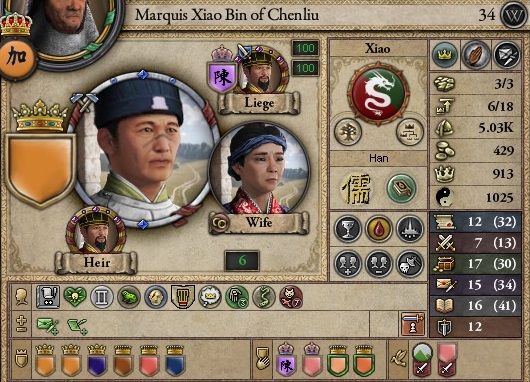
Meanwhile, the Liang Army was in shamble after their defeat. They had retreated to Liang territories and fled from the danger of the Yellow River. And most of their leadership had either fled or been captured, like Xu Chu. News of his death only made things worse in the army camp, and deserters soon became a problem. One young officer, seeing his chance to show his talent, stepped up to take command of the camp. No one really opposed Zhang Yao when he became the leader, mostly because no one really wanted the job of fixing the situation (and the blame for failing to do so).
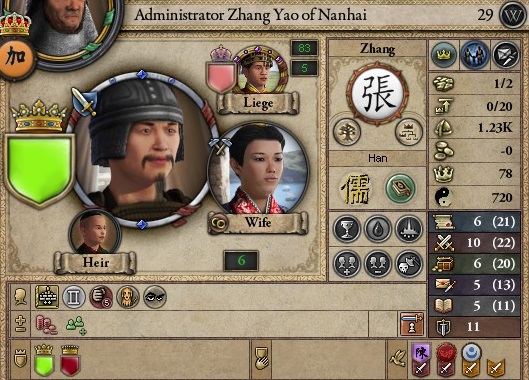
But Zhang Yao would have no time to reorganize his troops, as the Chen army was fast approaching. With their newfound momentum, Hu Zan and his fellow generals had to take the fight to the Liang Dynasty, marking the first time that a Chen force penetrated the Liang borders. This took Zhang Yao by surprise, who now had to prepare his highly diminished army to face the enemies that were charging at them. But if Xu Chu with a larger army had failed to stop the Chen generals, then a lesser officer like Zhang Yao with half those troops had no chance. He did put a valiant fight, but his short temper got the better of him. The Chen army easily achieved victory, killing half of the Liang soldiers.

While some officers wanted to continue, pointing out that they had reserves to send, Emperor Wen decided that it was time to cut his losses. This had always been Xu Chu’s campaign, not his. Now that the brute was dead (which was a welcomed surprise), the Emperor wanted to end this war as soon as possible. He was finally free of Xu Chu, only to have Chen troops into his dynasty. He wanted this campaign to be over, the Chen troops out, and no more generals ordering him around. He was even willing to pay massive sums of coins (which he had to borrow) in order to end this.
Envoys from Chang’an were sent to Chenguo, where Emperor Wu received them with all the official honors given to foreign dignitaries. The negotiations went smoothly, with Chancellor Xiao Bin leading the talks. A payment for peace was agreed, as was a ransom for the soldiers and officers that were captured. The first war between the two dynasties ended in March 231, a year after it had been declared. More importantly, this conflict would mark the normalization of diplomatic relations between the Chen and the Liang. Emperor Cheng had always declared the Liang Dynasty usurpers that should not be tolerated, while Emperor Anwu had looked at the Chen as pathetic pretenders unworthy of his acknowledgement. For the first time, each side were recognizing that there were two dynasties in China. And while they remained rivals, they now accepted the existence of the other. At least until they could conquer one another and unify the realm.


